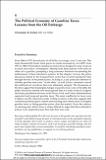The Political Economy of Gasoline Taxes: Lessons from the Oil Embargo
Author(s)
Knittel, Christopher Roland
Download675589.pdf (1014.Kb)
PUBLISHER_POLICY
Publisher Policy
Article is made available in accordance with the publisher's policy and may be subject to US copyright law. Please refer to the publisher's site for terms of use.
Terms of use
Metadata
Show full item recordAbstract
From 1864 to 1972, the real price of oil fell by, on average, over 1% per year. This trend dramatically broke when prices for crude increased by over 650% from 1972 to 1980. Policymakers adopted several policies designed to keep oil prices in check and reduce consumption. Missing from these policies were taxes on either oil or gasoline, prompting a long economics literature documenting the inefficiencies of these alternative policies. In this chapter, I review the policy discussion related to the transportation sector that occurred during the time through the lens of the printed press. In doing so, I pay particular attention to whether gasoline taxes were “on the table,” as well as how consumers viewed the inefficient set of policies that were ultimately adopted. The discussions at the time suggest that meaningful changes in gasoline taxes were on the table; the public discussion seemed to be much greater than it is today. Some in Congress and many presidential advisors in the Nixon, Ford, and Carter administrations supported and proposed gasoline taxes. The main roadblocks for taxes were Congress and the American people. Polling evidence at the time suggests that consumers preferred price controls and rationing and vehicle taxes over higher gasoline taxes or letting gasoline prices clear the market. Given the saliency of rationing and vehicle taxes, it seems difficult to argue that these alternative policies were adopted because they hide their true costs.
Date issued
2014-01Department
Sloan School of ManagementJournal
Tax Policy and the Economy
Publisher
University of Chicago Press
Citation
Knittel, Christopher R. “The Political Economy of Gasoline Taxes: Lessons from the Oil Embargo.” Tax Policy and the Economy 28, 1 (January 2014): 97–131 © 2014 National Bureau of Economic Research
Version: Final published version
ISSN
0892-8649
1537-2650